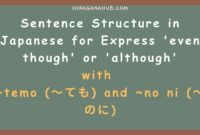In this lesson, we will learn Japanese grammar patterns (に行く) and
(に来る). The verb iku means “to go,” while kuru means “to come.” Ready to
learn today? Let’s dive right in!
Learn Japanese Grammar に行く)
Meaning: to go for…
Explanation: The pattern ~ni iku expresses going with the purpose of doing
something.
Note: When using the verb suru (to do), using the noun followed by ~ni iku is
common instead of the complete construction. For example, rather than saying
“Nihon e benkyou shi ni ikimasu” (to go to Japan to study), it’s more natural
to say “Nihon e benkyou ni ikimasu.”
Kanji: ~に行く
Formula: root form of the verb + ni iku
Example Sentences:
映画館に映画を見に行こうか
Eigakan ni eiga o mi ni ikou ka
“Shall we go to the cinema to watch a movie?”
私たちは湖へつりに行った
Watashitachi wa mizuumi e tsuri ni itta
“We went to the lake to fish.”
お母さん、遊びに行っていい?
Okaa-san, asobi ni itte ii?
“Mom, may I go out to play?”
明日私は空港にあなたを迎えに行きます
Ashita watashi wa kuukou ni anata o mukae ni ikimasu
“Tomorrow, I will go to the airport to pick you up.”
Learn Japanese Grammar に来る)
Meaning: to come for…
Explanation: The pattern ~ni kuru indicates coming to do something.
Note: Similar to ~ni iku, it’s also more natural to directly use the noun
followed by ~ni kuru when combined with the verb suru. For instance, “Nihon e
benkyou ni kuru” means “coming to Japan to study.”
Kanji: ~に来る
Formula: root form of the verb + ni kuru
Example Sentences:
今日友だちは私の新しい自動車を見に来るって
Kyō tomodachi wa watashi no atarashii jidōsha o mi ni kuru tte
“My friend said they will see my new car today.”
来週の日曜日に私の家に遊びに来てくださいね
Raishuu no nichiyoubi ni watashi no, i.e. ni asobi ni kite kudasai ne
“Please come and visit my house next Sunday!”
駅に妹を迎えに来てくれませんか
Eki ni imouto o mukae ni kite kuremasen ka
“Could you come to the station to pick up my sister?”
オレたちはこの国に、カイドウに勝ちに来たんだ
Oretachi wa kono kuni ni, Kaidou ni kachi ni kitan da
“We came to this country to defeat Kaidou.”
How was that? It was not too tricky. If you’re still unclear, grab a drink and
revisit the material. Thank you for joining today’s lesson. I am looking
forward to seeing you in the next class! Until then, happy learning!



